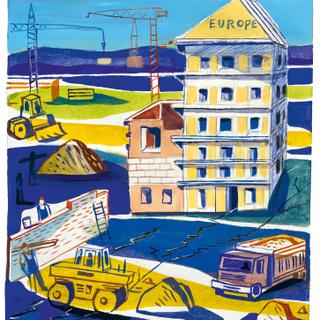Cédric Klapisch's The Spanish Apartment was released in 2002. It explored the sometimes tumultuous daily lives of European students sharing a flat in Barcelona: Xavier, the naïve Frenchman who dreams of being a writer, Wendy, the Englishwoman, Soledad, the Spaniard, Lars, the Dane, and so on. "The film was a huge success because it came at the right time with a resonance that went beyond it: Flat-sharing is a metaphor for Europe, a mini-Europe in an apartment," said the director. The idea for the film came from his youth when he was a student in New York: "I felt closer to other Europeans, and I realized that we shared a lot. You have to be somewhere else to feel European."
But does this common cultural identity, this Europeanness, really exist? And what are its boundaries? And is European identity primarily a spontaneous inheritance, or a future to be built together on the basis of mutual desire? The issue became central following the fall of the Iron Curtain in 1989, when countries in the Eastern bloc emerged from the Soviet yoke and came knocking at the Union's door. It remained so when Turkey, an official candidate since 1999, applied for membership.
Indeed, Europeanness, if it can be precisely defined, refers to a set of values and ideas, to ways of thinking forged over the centuries, and also to a sense of belonging. It goes hand in hand with a dream that has long haunted Europe: building a common home.
Clearly, the cultural heritage shared by Europeans is first and foremost the fruit of history. In 1924, in Note (ou l'Européne), ("Note (or the European)") the poet and writer Paul Valéry traced the foundations of European thought back to ancient Greece: "We owe to it the discipline of the Spirit (...). We owe to it a method of thought that tends to relate all things to man, to the complete man." Greek thought – that of Socrates, Plato and Aristotle, of Homer, Herodotus, Thucydides, Euripides and Sophocles – had a lasting influence on the continent, even if it was not until the Renaissance that these authors were rediscovered. And when, in the late 1970s, the question of Greek membership of the European Community arose, French president Valéry Giscard d'Estaing thundered: "You can't play Plato in the second division." The die was cast: Greece joined the Community in 1981.
From ancient Rome to the year 1,000
Athens is the cradle of democracy – from the ancient Greek dêmos, "people", and kratos, "power". A political system was forged there between the 7th and 5th centuries BC and destined to become the paradigm of governance in Europe. Nearly two and a half thousand years later, Europe is undoubtedly the continent where democracy is most deeply rooted, even if it has moved away from the Greek model of direct democracy.
You have 87.22% of this article left to read. The rest is for subscribers only.
